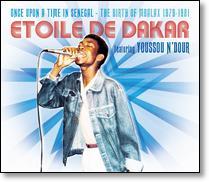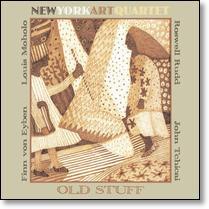A Consumer Guide to the Trailing Edge: August, 2010
Recycled Goods (#77)
by Tom Hull
 |
 |
Limping more than usual this usual this month. It's been hot and miserable, and I've been playing jazz trying to wrap up a Jazz CG column. Wound up recycling one of the jazz finds for a pick hit, plus another record that's so obvious I'm almost embarrased to have to run with it. More jazz below the line, plus the first two Loudon Wainwright albums -- Rhino was too cheap to send them when I did my Rolling Stone Album Guide piece on Wainwright, but I found them on Rhapsody and for good measures attributed them a friendlier reissue label.
Etoile de Dakar: Once Upon a Time in Senegal: The Birth of Mbalax, 1979-1981 (1979-81 [2010], Sterns Africa, 2CD): Best known today for their young singer, Youssou N'Dour, listed in the notes under "what they're doing now" as "an internationally famous musician." What distinguished mbalax from the salsa popular in Senegal at the time was the complexity of the rhythms, lots of them running roughshod over one another, with prickly guitar and punchy horns. Sound is a bit harsh, but the noise is part of what made them so vital. Probably the best intro -- the single-disc Rough Guide to Youssou N'Dour and Etoile de Dakar covers the same period more economically, but only duplicates 4 of 23 songs here, so they're far from redundant. I've long kicked myself for missing the third of four presumedly comprehensive volumes Sterns reissued in 1993-98. This fills in 4 of the 7 tracks I missed, and adds 7 more that missed the previous round. A
New York Art Quartet: Old Stuff (1965 [2010], Cuneiform): Short-lived group, long remembered. Danish alto saxophonist John Tchicai teamed with trombonist Roswell Rudd to cut two 1964-65 albums, an eponymous one on ESP-Disk that has remained in print more often than not, and a second that soon vanished, leaving us with nothing more until the pair got together in 1999 and cut 35th Reunion. These radio shots add significantly to their legacy, another 70 minutes (compared to 43 on the first album). The bass and drums slots were variable: Finn von Eyben plays bass here, and Louis Moholo drums. Rudd was working out the logic of free jazz trombone, and Tchicai lets him run with it, filling in and edging around. A-
Otis Redding & His Orchestra: Live on the Sunset Strip (1966 [2010], Stax, 2CD): Posthumous rehashings of live performances are inevitable with a star of Redding's magnitude and energy, but this one goes back to the one live album released during his lifetime, In Person at the Whisky a Go Go. It surveys a four-night stand, sweeping up the 10 cuts selected for the original, plus the 12 from the 1993 Vol. 2, plus 6 more to fill up 130 minutes. The usual problems crop up: the horns are barely one-dimensional, the band likes to throw it into overdrive, and most of the songs are definitive on must-have studio albums. He strains with the pace and loses grip here and there, but songs like "These Arms of Mine" survive, and after a prolonged bad impersonation of the JBs, the band finally clicks on the closers, superhot takes of "Papa's Got a Brand New Bag" and "Satisfaction" that rival anything their originators have done. B+(***) [R]
Rachid Taha: Rock El Casbah: The Best Of (1986-2004 [2008], Wrasse): Algerian raļ great, emigrated to France in 1968 and only looked back to pick up classic melodies for his Diwan and Diwan 2 albums, as good a place to get the hang of raļ's electrified dance beats as any. He resurrected the Clash song after Bush invaded Iraq, the odd song out here although his English label took it as the key to reissuing what was originally called The Definitive Collection. What marks it as "definitive" is that it liberally samples albums earlier than his Diwan breakthrough, making it more erratic than his later albums, like the magnificent Made in Medina, which contributes the most powerful song here: "Barra Barra." B+(***)
Briefly Noted
Cedar Chest: The Cedar Walton Songbook [The Composer Collection Volume 6] (2000-08 [2010], High Note): A much deserved nod, but post-1960s jazz composers don't get covered much, and by eschewing Walton's own six albums on the label they wind up doubling on Larry Coryell, Sammy Figueroa, and Fathead Newman, plus pulling a not-awful vocal from Mark Murphy; high points are the piano, which Walton himself plays on four of ten tracks. B
Johnny Griffin: Live at Ronnie Scott's (2008 [2010], In+Out): A live shot two months before the Little Giant expired, his characteristic role as the live wire on tenor sax mostly eclipsed by hard-working Roy Hargrove on trumpet and flugelhorn. B+(**)
Michael Hurley: First Songs (1964 [2009], Folkways): First guitar and voice scratchings of the folkie best remembered for landing his name first on the super Have Moicy!; voice is familiar, songs could be slyer, not to mention funnier, but the label wasn't expecting much either. B [R]
Issa Juma & Super Wanyika Stars: World Defeats the Grandfathers (1982-86 [2010], Sterns): "Swinging Swahili Rumba" goes the subtitle, with Tanzanian singer Juma in front of one of a dozen or so Wanyika band variants popular in Nairobi from 1971 on; rumba, and later soukous, comes from across the Congo, an easy transport to East Africa, so consistently played and sung here that it seems like it can go on forever. B+(***) [R]
King Khan: Songs From the Films of Shakrukh Khan (1992-2002 [2010], Times Square): The booklet is filled with pics of the Bollywood actor, who doesn't sing any of the thirteen songs assembled in this loud, bouncy sampler; Lata Mangeshkar, famous enough to have her own Rough Guide, and the much younger Udit Narayan are by far the most frequent vocalists. B+(**)
Ricardo Lemvo & Makina Loca: Isabella (2007, Mopiato Music): Born in Kinshasa with roots tracing to Angola, moved to Los Angeles when he was 15, with Cuban music his touchstone, comfortable in many worlds, able to translate rumba coming and going, and slip in a little salsa on the side. A-
Music of the Sphere: Thelonious Monk Songbook [The Composer Collection Volume 5] (1977-2009 [2010], High Note): Monk has been covered so frequently it is hard to grasp that he was once deemed unplayable; his idiosyncrasies should at lesat bind this label sampler -- two archival cuts, the rest since 1998 -- together, but the mix is so jumbled and uninspired you'd think the compiler was aiming at his own form of nutty-ness. B-
Next Stop . . . Soweto, Vol. 1 (1969-75 [2010], Strut): Classic South African township jive, the mbaqanga that has already floated anthologies like The Industructible Beat of Soweto, or more precisely, the extra takes that help fill out the picture, featuring a couple well known artists like Mahlathini and the Mahotella Queens, and a lot I don't have a clue about; expect two more volumes. B+(***) [R]
Placebo: Covers (1997-2005 [2010], Virgin): Ten B-sides and stray tracks, as befits a British band founded c. 1995, mostly glam and alt-rock from not much before the 1980s -- Marc Bolan's "20th Century Boy" is a far oldie here; straightforward, with some crunch, no doubt how they cut their teeth. B+(*) [R]
Loudon Wainwright III: Album I (1970 [2006], Collectors' Choice Music): Originally eponymous, retrospectively numbered to fit the series, the pampered singer-songwriter from Westchester styled himself as folk because it was cheaper and simpler that way; high lonesome voice, sharp strummed guitar, melodies that held up well enough, words that had some detail and panache, none of those things especially well developed. B+(*) [R]
Loudon Wainwright III: Album II (1971 [2006], Collector's Choice Music): Sophomore album is thin on melody, thinner still on harmony, mostly just wordplay that is more matter of fact than packed with hidden meaning; he struggles with love, struggles with sex, struggles with flying, struggles at home. B [R]
Legend: B+ records are divided into three levels, where more * is better. [R] indicates record was reviewed using a stream from Rhapsody. The biggest caveat there is that the packaging and documentation hasn't been inspected or considered, and documentation is especially important for reissues. But also my exposure to streamed records is briefer and more limited, so I'm more prone to snap judgments.
For this column and the previous 76, see the archive.
Copyright © 2010 Tom Hull.